Business laws Assignment 2022
VerifiedAdded on 2022/10/19
|9
|2054
|12
Assignment
AI Summary
Contribute Materials
Your contribution can guide someone’s learning journey. Share your
documents today.
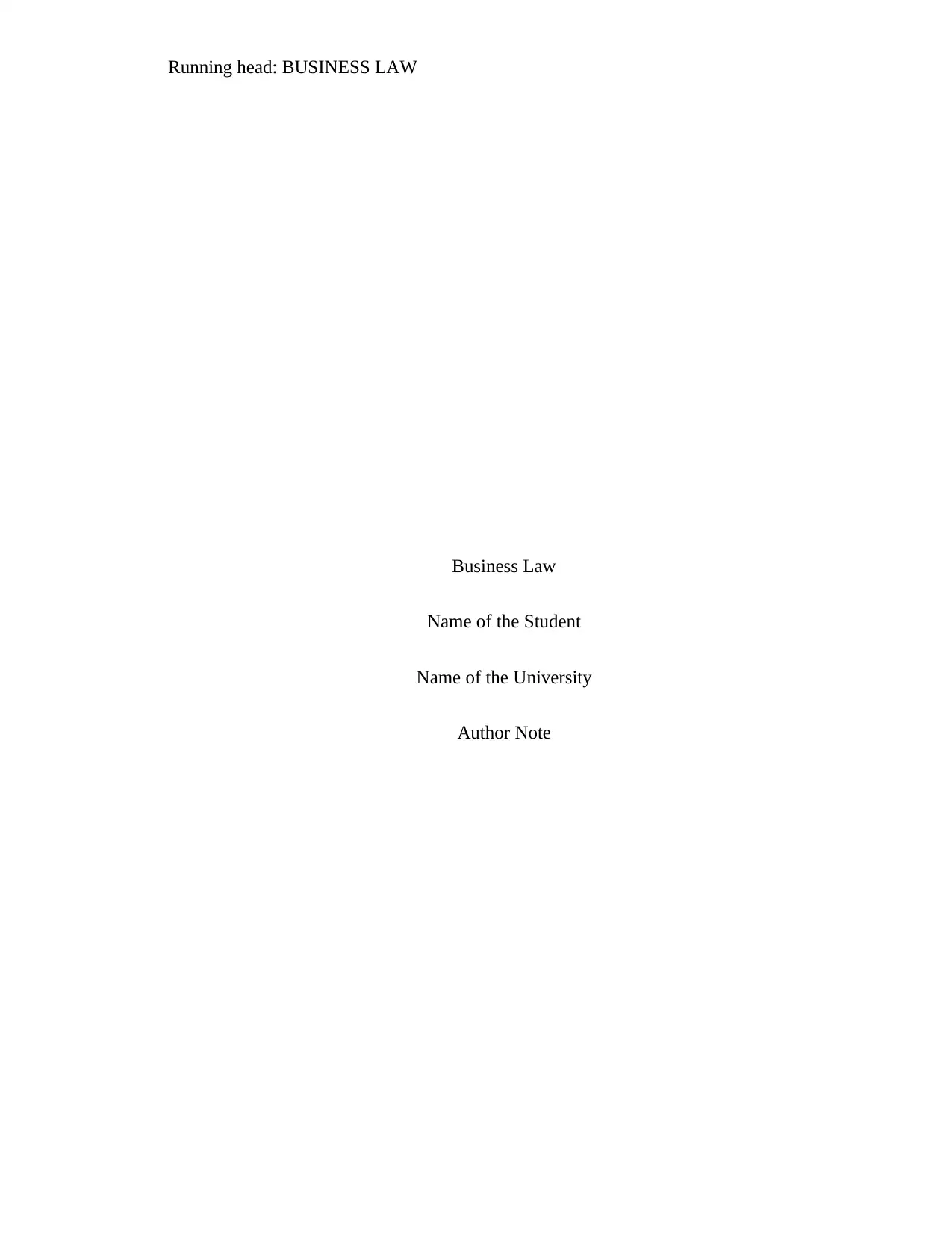
Running head: BUSINESS LAW
Business Law
Name of the Student
Name of the University
Author Note
Business Law
Name of the Student
Name of the University
Author Note
Secure Best Marks with AI Grader
Need help grading? Try our AI Grader for instant feedback on your assignments.
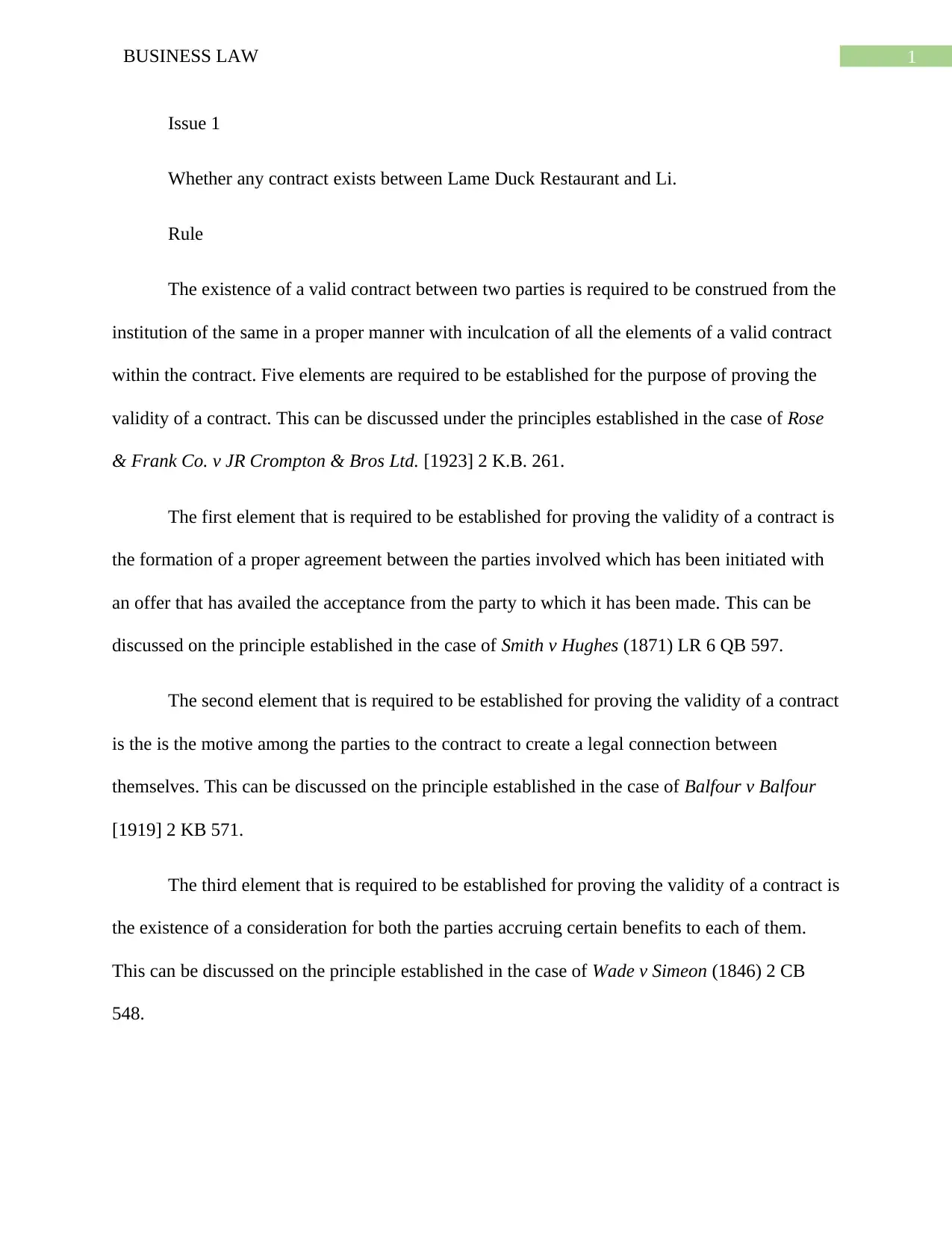
1BUSINESS LAW
Issue 1
Whether any contract exists between Lame Duck Restaurant and Li.
Rule
The existence of a valid contract between two parties is required to be construed from the
institution of the same in a proper manner with inculcation of all the elements of a valid contract
within the contract. Five elements are required to be established for the purpose of proving the
validity of a contract. This can be discussed under the principles established in the case of Rose
& Frank Co. v JR Crompton & Bros Ltd. [1923] 2 K.B. 261.
The first element that is required to be established for proving the validity of a contract is
the formation of a proper agreement between the parties involved which has been initiated with
an offer that has availed the acceptance from the party to which it has been made. This can be
discussed on the principle established in the case of Smith v Hughes (1871) LR 6 QB 597.
The second element that is required to be established for proving the validity of a contract
is the is the motive among the parties to the contract to create a legal connection between
themselves. This can be discussed on the principle established in the case of Balfour v Balfour
[1919] 2 KB 571.
The third element that is required to be established for proving the validity of a contract is
the existence of a consideration for both the parties accruing certain benefits to each of them.
This can be discussed on the principle established in the case of Wade v Simeon (1846) 2 CB
548.
Issue 1
Whether any contract exists between Lame Duck Restaurant and Li.
Rule
The existence of a valid contract between two parties is required to be construed from the
institution of the same in a proper manner with inculcation of all the elements of a valid contract
within the contract. Five elements are required to be established for the purpose of proving the
validity of a contract. This can be discussed under the principles established in the case of Rose
& Frank Co. v JR Crompton & Bros Ltd. [1923] 2 K.B. 261.
The first element that is required to be established for proving the validity of a contract is
the formation of a proper agreement between the parties involved which has been initiated with
an offer that has availed the acceptance from the party to which it has been made. This can be
discussed on the principle established in the case of Smith v Hughes (1871) LR 6 QB 597.
The second element that is required to be established for proving the validity of a contract
is the is the motive among the parties to the contract to create a legal connection between
themselves. This can be discussed on the principle established in the case of Balfour v Balfour
[1919] 2 KB 571.
The third element that is required to be established for proving the validity of a contract is
the existence of a consideration for both the parties accruing certain benefits to each of them.
This can be discussed on the principle established in the case of Wade v Simeon (1846) 2 CB
548.
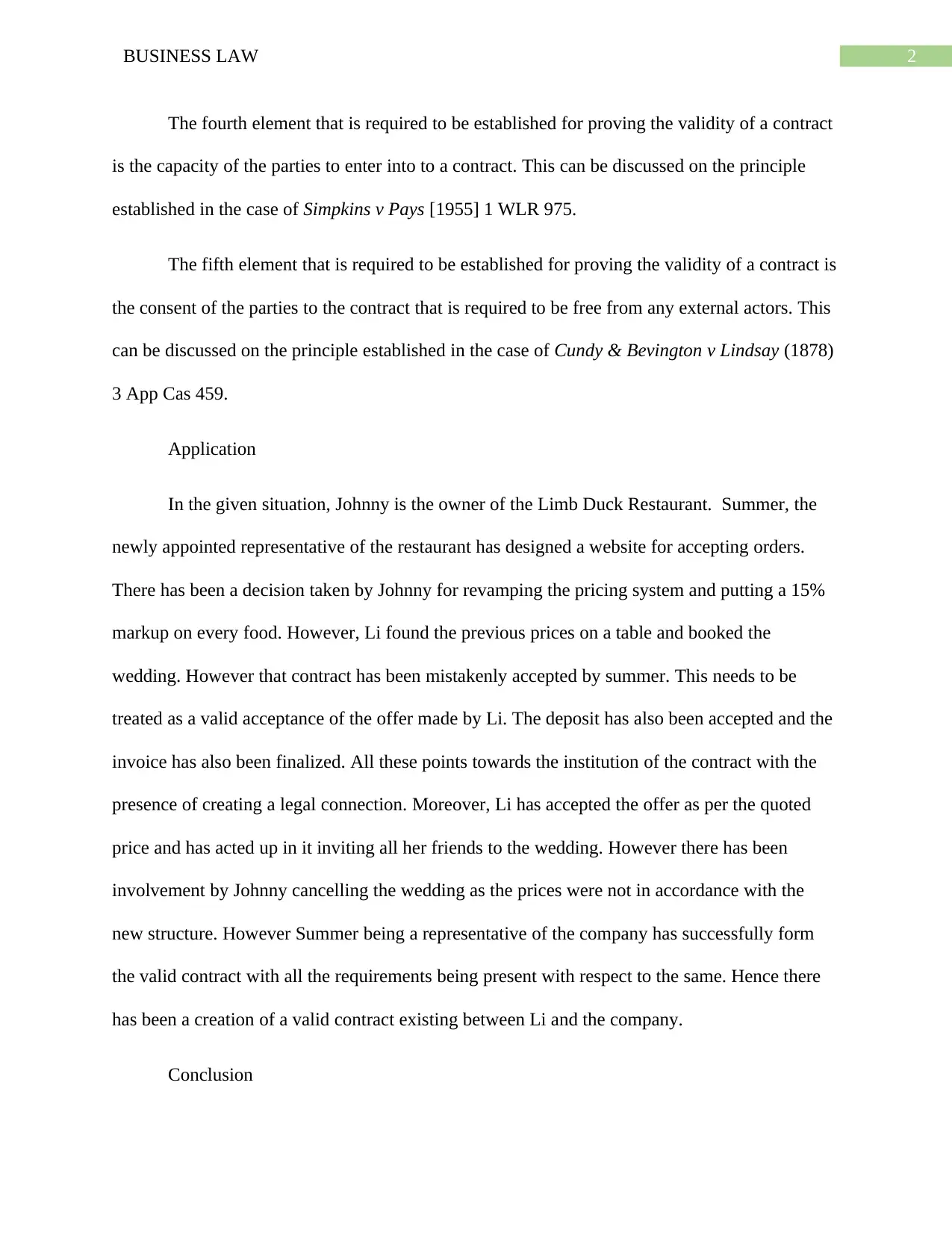
2BUSINESS LAW
The fourth element that is required to be established for proving the validity of a contract
is the capacity of the parties to enter into to a contract. This can be discussed on the principle
established in the case of Simpkins v Pays [1955] 1 WLR 975.
The fifth element that is required to be established for proving the validity of a contract is
the consent of the parties to the contract that is required to be free from any external actors. This
can be discussed on the principle established in the case of Cundy & Bevington v Lindsay (1878)
3 App Cas 459.
Application
In the given situation, Johnny is the owner of the Limb Duck Restaurant. Summer, the
newly appointed representative of the restaurant has designed a website for accepting orders.
There has been a decision taken by Johnny for revamping the pricing system and putting a 15%
markup on every food. However, Li found the previous prices on a table and booked the
wedding. However that contract has been mistakenly accepted by summer. This needs to be
treated as a valid acceptance of the offer made by Li. The deposit has also been accepted and the
invoice has also been finalized. All these points towards the institution of the contract with the
presence of creating a legal connection. Moreover, Li has accepted the offer as per the quoted
price and has acted up in it inviting all her friends to the wedding. However there has been
involvement by Johnny cancelling the wedding as the prices were not in accordance with the
new structure. However Summer being a representative of the company has successfully form
the valid contract with all the requirements being present with respect to the same. Hence there
has been a creation of a valid contract existing between Li and the company.
Conclusion
The fourth element that is required to be established for proving the validity of a contract
is the capacity of the parties to enter into to a contract. This can be discussed on the principle
established in the case of Simpkins v Pays [1955] 1 WLR 975.
The fifth element that is required to be established for proving the validity of a contract is
the consent of the parties to the contract that is required to be free from any external actors. This
can be discussed on the principle established in the case of Cundy & Bevington v Lindsay (1878)
3 App Cas 459.
Application
In the given situation, Johnny is the owner of the Limb Duck Restaurant. Summer, the
newly appointed representative of the restaurant has designed a website for accepting orders.
There has been a decision taken by Johnny for revamping the pricing system and putting a 15%
markup on every food. However, Li found the previous prices on a table and booked the
wedding. However that contract has been mistakenly accepted by summer. This needs to be
treated as a valid acceptance of the offer made by Li. The deposit has also been accepted and the
invoice has also been finalized. All these points towards the institution of the contract with the
presence of creating a legal connection. Moreover, Li has accepted the offer as per the quoted
price and has acted up in it inviting all her friends to the wedding. However there has been
involvement by Johnny cancelling the wedding as the prices were not in accordance with the
new structure. However Summer being a representative of the company has successfully form
the valid contract with all the requirements being present with respect to the same. Hence there
has been a creation of a valid contract existing between Li and the company.
Conclusion
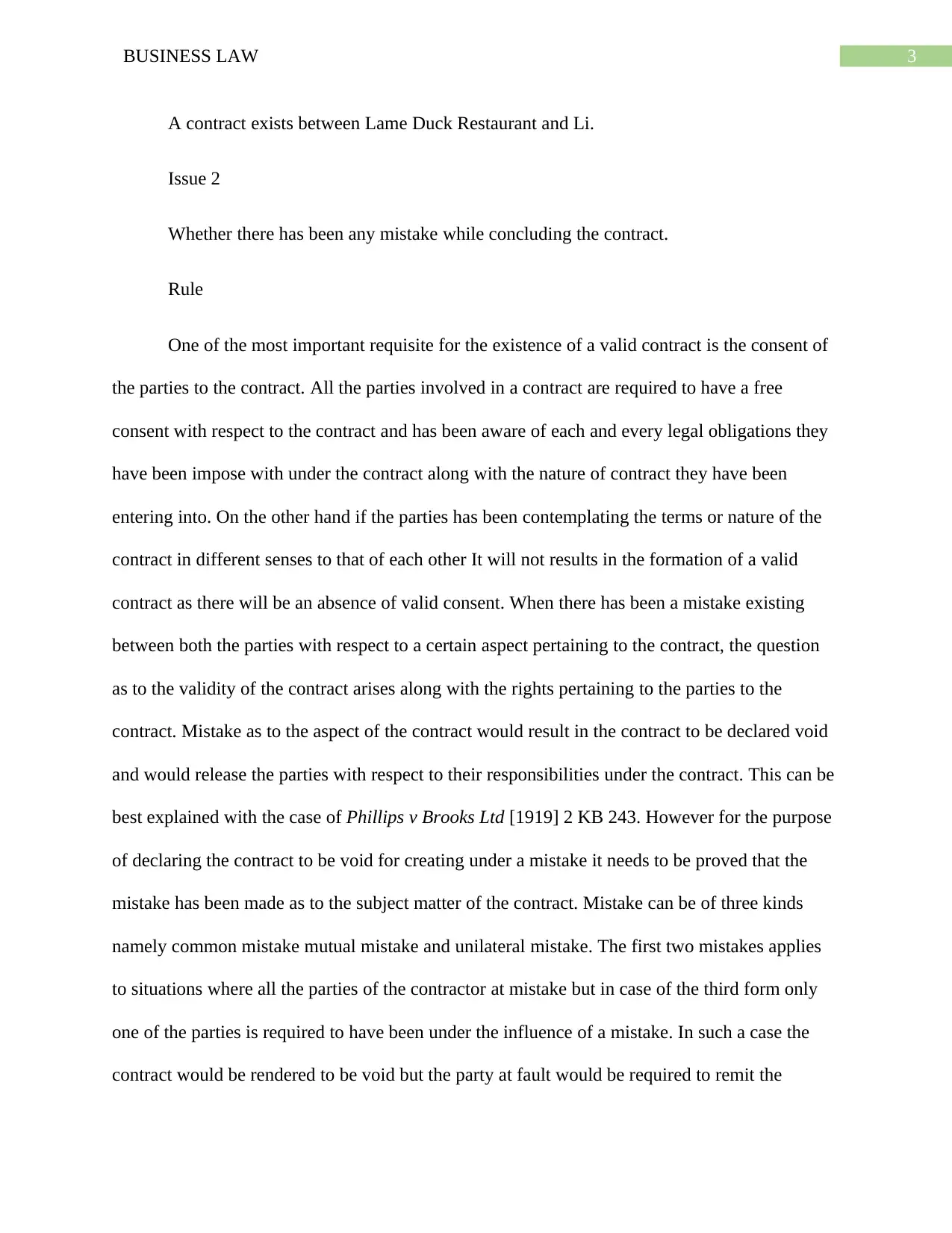
3BUSINESS LAW
A contract exists between Lame Duck Restaurant and Li.
Issue 2
Whether there has been any mistake while concluding the contract.
Rule
One of the most important requisite for the existence of a valid contract is the consent of
the parties to the contract. All the parties involved in a contract are required to have a free
consent with respect to the contract and has been aware of each and every legal obligations they
have been impose with under the contract along with the nature of contract they have been
entering into. On the other hand if the parties has been contemplating the terms or nature of the
contract in different senses to that of each other It will not results in the formation of a valid
contract as there will be an absence of valid consent. When there has been a mistake existing
between both the parties with respect to a certain aspect pertaining to the contract, the question
as to the validity of the contract arises along with the rights pertaining to the parties to the
contract. Mistake as to the aspect of the contract would result in the contract to be declared void
and would release the parties with respect to their responsibilities under the contract. This can be
best explained with the case of Phillips v Brooks Ltd [1919] 2 KB 243. However for the purpose
of declaring the contract to be void for creating under a mistake it needs to be proved that the
mistake has been made as to the subject matter of the contract. Mistake can be of three kinds
namely common mistake mutual mistake and unilateral mistake. The first two mistakes applies
to situations where all the parties of the contractor at mistake but in case of the third form only
one of the parties is required to have been under the influence of a mistake. In such a case the
contract would be rendered to be void but the party at fault would be required to remit the
A contract exists between Lame Duck Restaurant and Li.
Issue 2
Whether there has been any mistake while concluding the contract.
Rule
One of the most important requisite for the existence of a valid contract is the consent of
the parties to the contract. All the parties involved in a contract are required to have a free
consent with respect to the contract and has been aware of each and every legal obligations they
have been impose with under the contract along with the nature of contract they have been
entering into. On the other hand if the parties has been contemplating the terms or nature of the
contract in different senses to that of each other It will not results in the formation of a valid
contract as there will be an absence of valid consent. When there has been a mistake existing
between both the parties with respect to a certain aspect pertaining to the contract, the question
as to the validity of the contract arises along with the rights pertaining to the parties to the
contract. Mistake as to the aspect of the contract would result in the contract to be declared void
and would release the parties with respect to their responsibilities under the contract. This can be
best explained with the case of Phillips v Brooks Ltd [1919] 2 KB 243. However for the purpose
of declaring the contract to be void for creating under a mistake it needs to be proved that the
mistake has been made as to the subject matter of the contract. Mistake can be of three kinds
namely common mistake mutual mistake and unilateral mistake. The first two mistakes applies
to situations where all the parties of the contractor at mistake but in case of the third form only
one of the parties is required to have been under the influence of a mistake. In such a case the
contract would be rendered to be void but the party at fault would be required to remit the
Secure Best Marks with AI Grader
Need help grading? Try our AI Grader for instant feedback on your assignments.
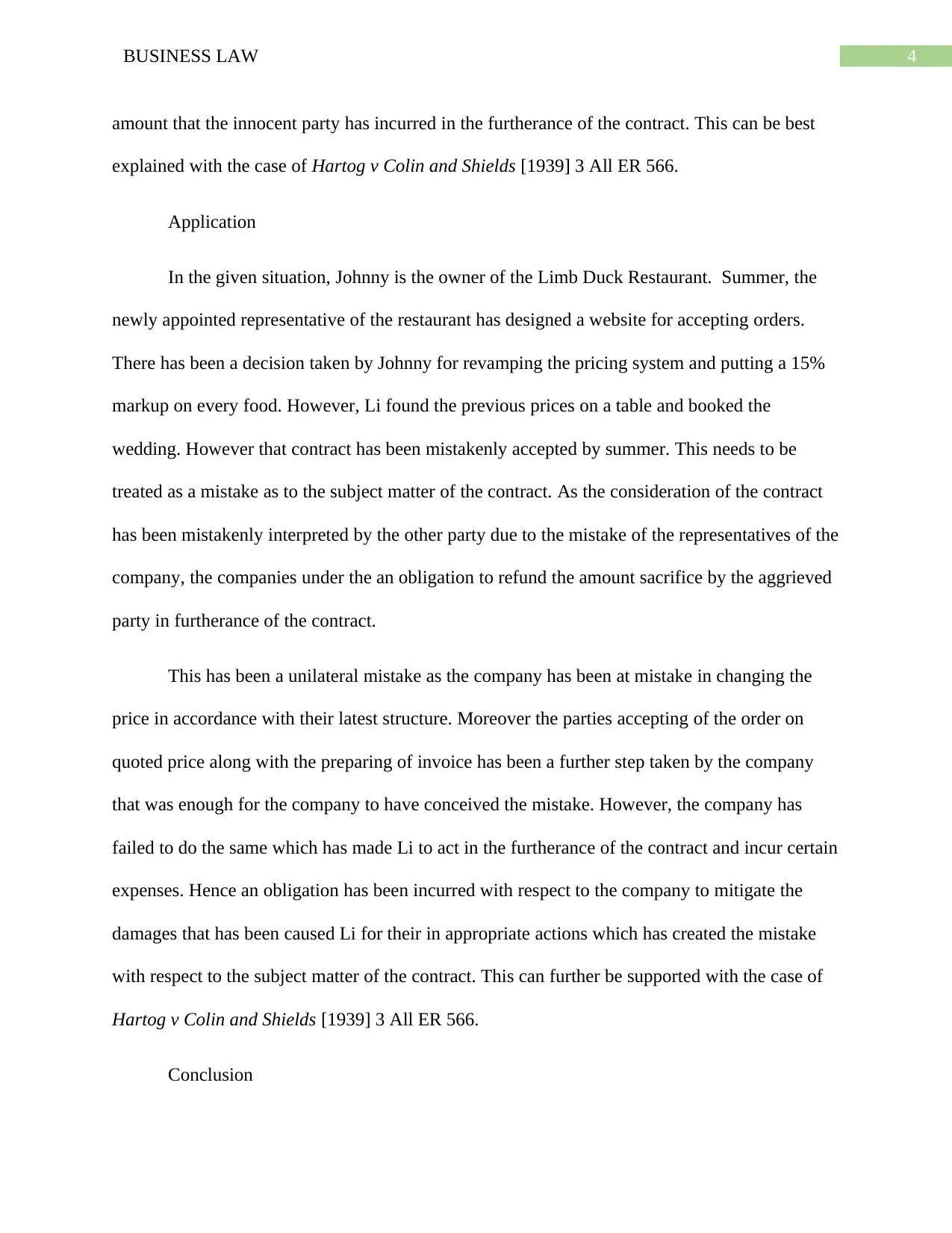
4BUSINESS LAW
amount that the innocent party has incurred in the furtherance of the contract. This can be best
explained with the case of Hartog v Colin and Shields [1939] 3 All ER 566.
Application
In the given situation, Johnny is the owner of the Limb Duck Restaurant. Summer, the
newly appointed representative of the restaurant has designed a website for accepting orders.
There has been a decision taken by Johnny for revamping the pricing system and putting a 15%
markup on every food. However, Li found the previous prices on a table and booked the
wedding. However that contract has been mistakenly accepted by summer. This needs to be
treated as a mistake as to the subject matter of the contract. As the consideration of the contract
has been mistakenly interpreted by the other party due to the mistake of the representatives of the
company, the companies under the an obligation to refund the amount sacrifice by the aggrieved
party in furtherance of the contract.
This has been a unilateral mistake as the company has been at mistake in changing the
price in accordance with their latest structure. Moreover the parties accepting of the order on
quoted price along with the preparing of invoice has been a further step taken by the company
that was enough for the company to have conceived the mistake. However, the company has
failed to do the same which has made Li to act in the furtherance of the contract and incur certain
expenses. Hence an obligation has been incurred with respect to the company to mitigate the
damages that has been caused Li for their in appropriate actions which has created the mistake
with respect to the subject matter of the contract. This can further be supported with the case of
Hartog v Colin and Shields [1939] 3 All ER 566.
Conclusion
amount that the innocent party has incurred in the furtherance of the contract. This can be best
explained with the case of Hartog v Colin and Shields [1939] 3 All ER 566.
Application
In the given situation, Johnny is the owner of the Limb Duck Restaurant. Summer, the
newly appointed representative of the restaurant has designed a website for accepting orders.
There has been a decision taken by Johnny for revamping the pricing system and putting a 15%
markup on every food. However, Li found the previous prices on a table and booked the
wedding. However that contract has been mistakenly accepted by summer. This needs to be
treated as a mistake as to the subject matter of the contract. As the consideration of the contract
has been mistakenly interpreted by the other party due to the mistake of the representatives of the
company, the companies under the an obligation to refund the amount sacrifice by the aggrieved
party in furtherance of the contract.
This has been a unilateral mistake as the company has been at mistake in changing the
price in accordance with their latest structure. Moreover the parties accepting of the order on
quoted price along with the preparing of invoice has been a further step taken by the company
that was enough for the company to have conceived the mistake. However, the company has
failed to do the same which has made Li to act in the furtherance of the contract and incur certain
expenses. Hence an obligation has been incurred with respect to the company to mitigate the
damages that has been caused Li for their in appropriate actions which has created the mistake
with respect to the subject matter of the contract. This can further be supported with the case of
Hartog v Colin and Shields [1939] 3 All ER 566.
Conclusion
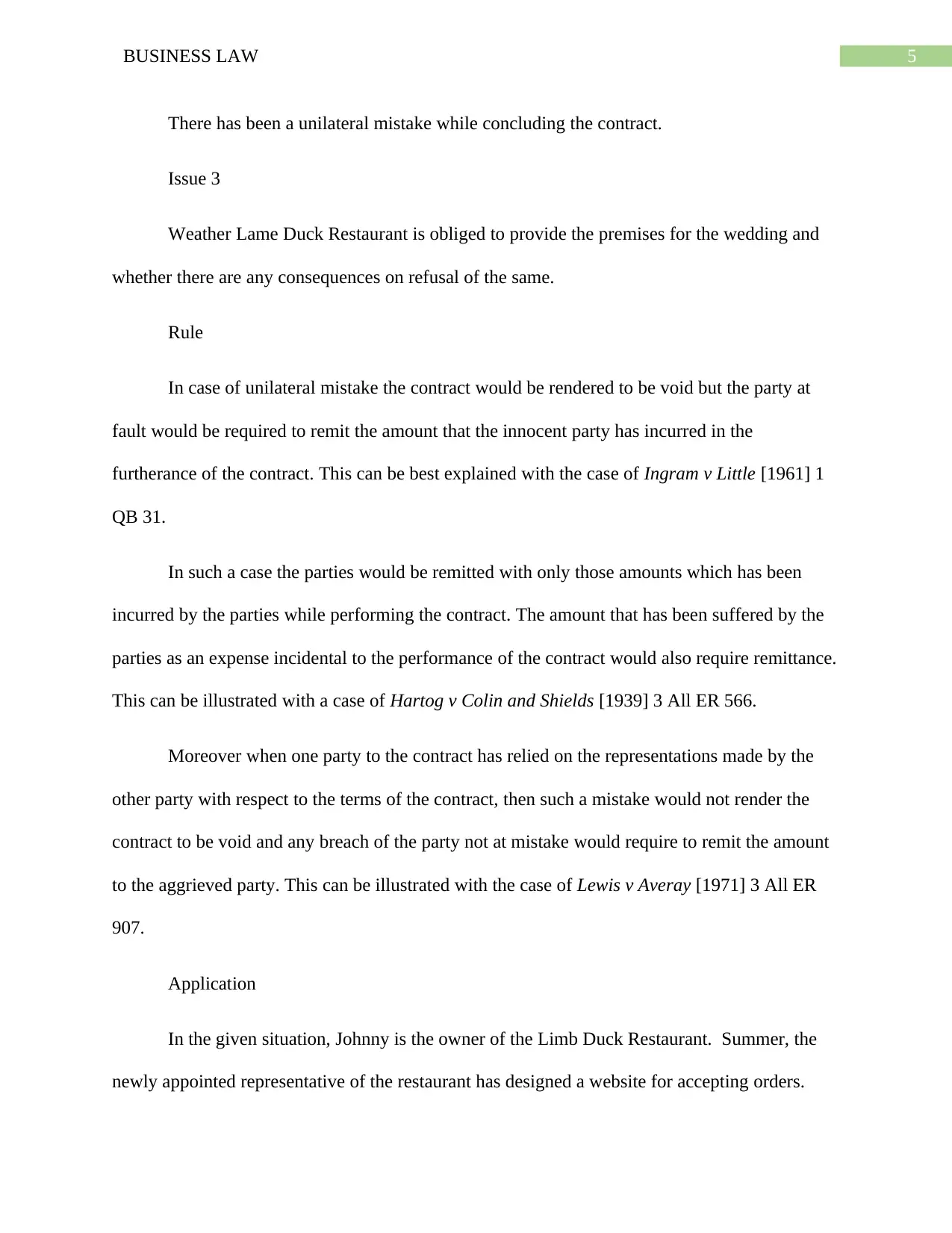
5BUSINESS LAW
There has been a unilateral mistake while concluding the contract.
Issue 3
Weather Lame Duck Restaurant is obliged to provide the premises for the wedding and
whether there are any consequences on refusal of the same.
Rule
In case of unilateral mistake the contract would be rendered to be void but the party at
fault would be required to remit the amount that the innocent party has incurred in the
furtherance of the contract. This can be best explained with the case of Ingram v Little [1961] 1
QB 31.
In such a case the parties would be remitted with only those amounts which has been
incurred by the parties while performing the contract. The amount that has been suffered by the
parties as an expense incidental to the performance of the contract would also require remittance.
This can be illustrated with a case of Hartog v Colin and Shields [1939] 3 All ER 566.
Moreover when one party to the contract has relied on the representations made by the
other party with respect to the terms of the contract, then such a mistake would not render the
contract to be void and any breach of the party not at mistake would require to remit the amount
to the aggrieved party. This can be illustrated with the case of Lewis v Averay [1971] 3 All ER
907.
Application
In the given situation, Johnny is the owner of the Limb Duck Restaurant. Summer, the
newly appointed representative of the restaurant has designed a website for accepting orders.
There has been a unilateral mistake while concluding the contract.
Issue 3
Weather Lame Duck Restaurant is obliged to provide the premises for the wedding and
whether there are any consequences on refusal of the same.
Rule
In case of unilateral mistake the contract would be rendered to be void but the party at
fault would be required to remit the amount that the innocent party has incurred in the
furtherance of the contract. This can be best explained with the case of Ingram v Little [1961] 1
QB 31.
In such a case the parties would be remitted with only those amounts which has been
incurred by the parties while performing the contract. The amount that has been suffered by the
parties as an expense incidental to the performance of the contract would also require remittance.
This can be illustrated with a case of Hartog v Colin and Shields [1939] 3 All ER 566.
Moreover when one party to the contract has relied on the representations made by the
other party with respect to the terms of the contract, then such a mistake would not render the
contract to be void and any breach of the party not at mistake would require to remit the amount
to the aggrieved party. This can be illustrated with the case of Lewis v Averay [1971] 3 All ER
907.
Application
In the given situation, Johnny is the owner of the Limb Duck Restaurant. Summer, the
newly appointed representative of the restaurant has designed a website for accepting orders.
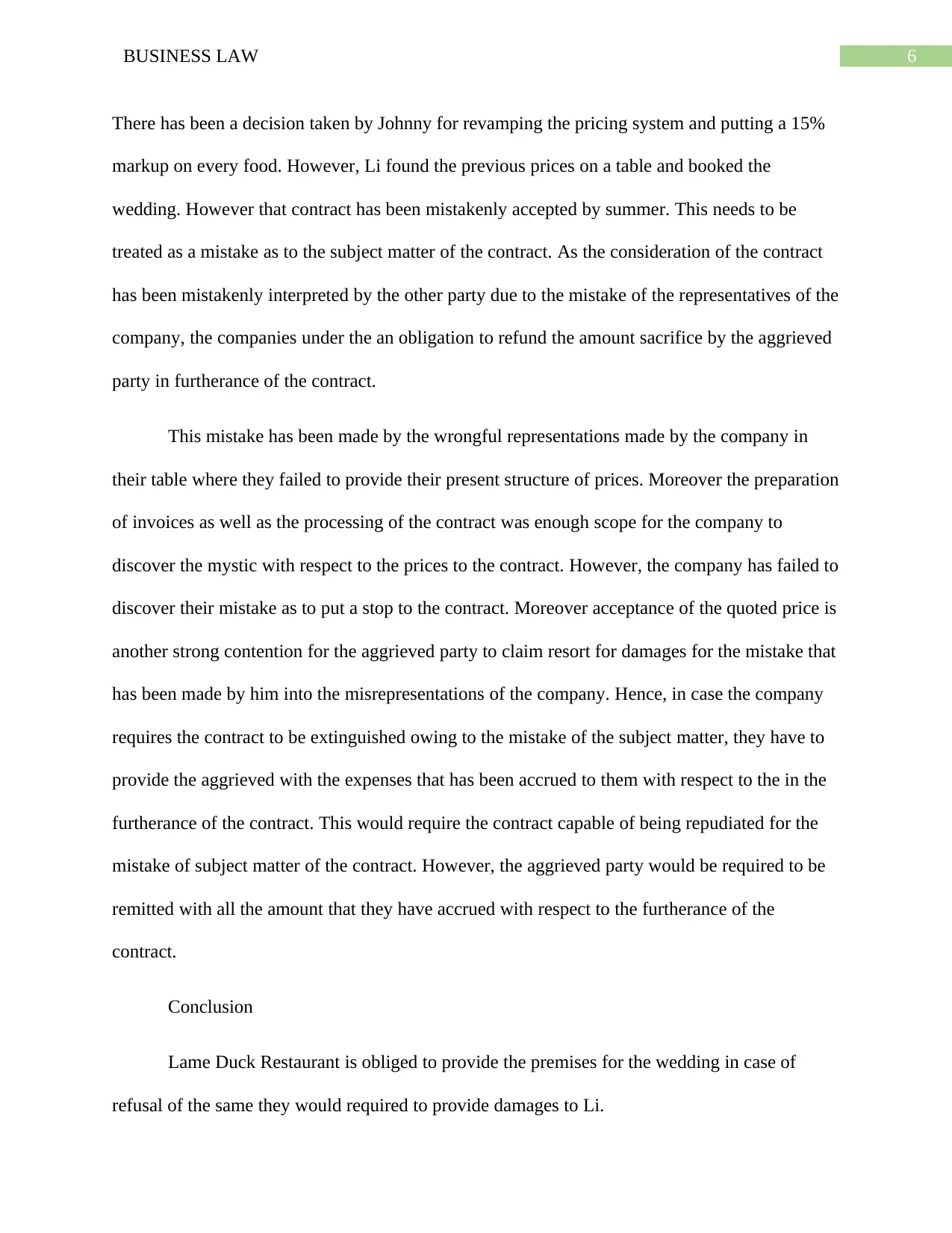
6BUSINESS LAW
There has been a decision taken by Johnny for revamping the pricing system and putting a 15%
markup on every food. However, Li found the previous prices on a table and booked the
wedding. However that contract has been mistakenly accepted by summer. This needs to be
treated as a mistake as to the subject matter of the contract. As the consideration of the contract
has been mistakenly interpreted by the other party due to the mistake of the representatives of the
company, the companies under the an obligation to refund the amount sacrifice by the aggrieved
party in furtherance of the contract.
This mistake has been made by the wrongful representations made by the company in
their table where they failed to provide their present structure of prices. Moreover the preparation
of invoices as well as the processing of the contract was enough scope for the company to
discover the mystic with respect to the prices to the contract. However, the company has failed to
discover their mistake as to put a stop to the contract. Moreover acceptance of the quoted price is
another strong contention for the aggrieved party to claim resort for damages for the mistake that
has been made by him into the misrepresentations of the company. Hence, in case the company
requires the contract to be extinguished owing to the mistake of the subject matter, they have to
provide the aggrieved with the expenses that has been accrued to them with respect to the in the
furtherance of the contract. This would require the contract capable of being repudiated for the
mistake of subject matter of the contract. However, the aggrieved party would be required to be
remitted with all the amount that they have accrued with respect to the furtherance of the
contract.
Conclusion
Lame Duck Restaurant is obliged to provide the premises for the wedding in case of
refusal of the same they would required to provide damages to Li.
There has been a decision taken by Johnny for revamping the pricing system and putting a 15%
markup on every food. However, Li found the previous prices on a table and booked the
wedding. However that contract has been mistakenly accepted by summer. This needs to be
treated as a mistake as to the subject matter of the contract. As the consideration of the contract
has been mistakenly interpreted by the other party due to the mistake of the representatives of the
company, the companies under the an obligation to refund the amount sacrifice by the aggrieved
party in furtherance of the contract.
This mistake has been made by the wrongful representations made by the company in
their table where they failed to provide their present structure of prices. Moreover the preparation
of invoices as well as the processing of the contract was enough scope for the company to
discover the mystic with respect to the prices to the contract. However, the company has failed to
discover their mistake as to put a stop to the contract. Moreover acceptance of the quoted price is
another strong contention for the aggrieved party to claim resort for damages for the mistake that
has been made by him into the misrepresentations of the company. Hence, in case the company
requires the contract to be extinguished owing to the mistake of the subject matter, they have to
provide the aggrieved with the expenses that has been accrued to them with respect to the in the
furtherance of the contract. This would require the contract capable of being repudiated for the
mistake of subject matter of the contract. However, the aggrieved party would be required to be
remitted with all the amount that they have accrued with respect to the furtherance of the
contract.
Conclusion
Lame Duck Restaurant is obliged to provide the premises for the wedding in case of
refusal of the same they would required to provide damages to Li.
Paraphrase This Document
Need a fresh take? Get an instant paraphrase of this document with our AI Paraphraser

7BUSINESS LAW
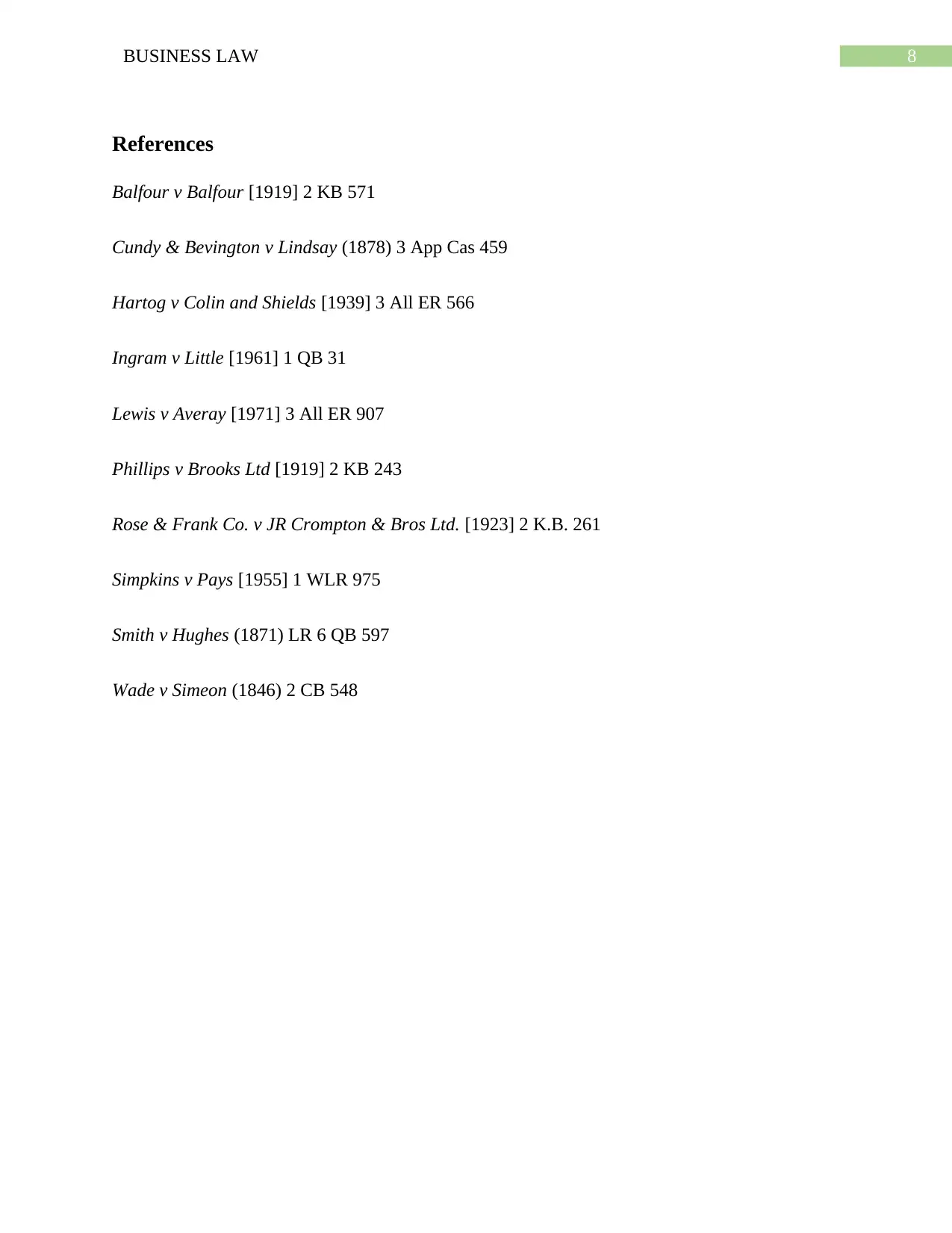
8BUSINESS LAW
References
Balfour v Balfour [1919] 2 KB 571
Cundy & Bevington v Lindsay (1878) 3 App Cas 459
Hartog v Colin and Shields [1939] 3 All ER 566
Ingram v Little [1961] 1 QB 31
Lewis v Averay [1971] 3 All ER 907
Phillips v Brooks Ltd [1919] 2 KB 243
Rose & Frank Co. v JR Crompton & Bros Ltd. [1923] 2 K.B. 261
Simpkins v Pays [1955] 1 WLR 975
Smith v Hughes (1871) LR 6 QB 597
Wade v Simeon (1846) 2 CB 548
References
Balfour v Balfour [1919] 2 KB 571
Cundy & Bevington v Lindsay (1878) 3 App Cas 459
Hartog v Colin and Shields [1939] 3 All ER 566
Ingram v Little [1961] 1 QB 31
Lewis v Averay [1971] 3 All ER 907
Phillips v Brooks Ltd [1919] 2 KB 243
Rose & Frank Co. v JR Crompton & Bros Ltd. [1923] 2 K.B. 261
Simpkins v Pays [1955] 1 WLR 975
Smith v Hughes (1871) LR 6 QB 597
Wade v Simeon (1846) 2 CB 548
1 out of 9
Related Documents
Your All-in-One AI-Powered Toolkit for Academic Success.
+13062052269
info@desklib.com
Available 24*7 on WhatsApp / Email
![[object Object]](/_next/static/media/star-bottom.7253800d.svg)
Unlock your academic potential
© 2024 | Zucol Services PVT LTD | All rights reserved.





